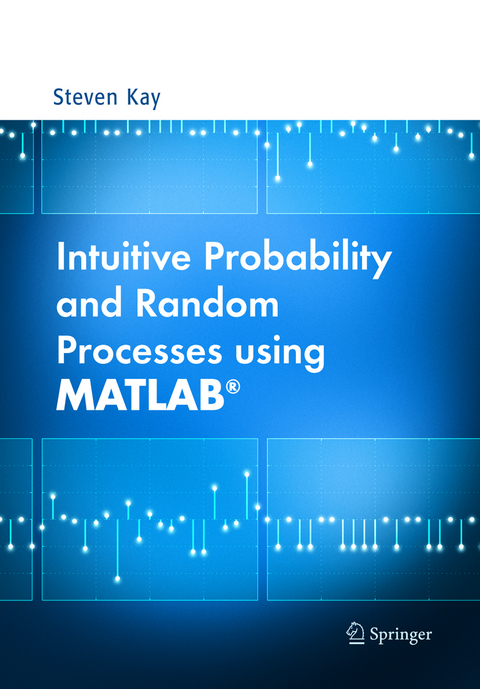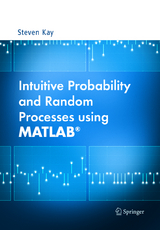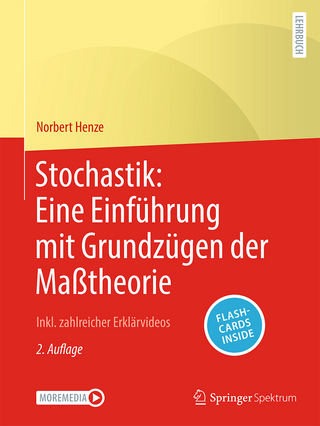Intuitive Probability and Random Processes using MATLAB®
Springer-Verlag New York Inc.
978-0-387-24157-9 (ISBN)
Intuitive Probability and Random Processes using MATLAB® is an introduction to probability and random processes that merges theory with practice. Based on the author’s belief that only "hands-on" experience with the material can promote intuitive understanding, the approach is to motivate the need for theory using MATLAB examples, followed by theory and analysis, and finally descriptions of "real-world" examples to acquaint the reader with a wide variety of applications. The latter is intended to answer the usual question "Why do we have to study this?" Other salient features are:
*heavy reliance on computer simulation for illustration and student exercises
*the incorporation of MATLAB programs and code segments
*discussion of discrete random variables followed by continuous random variables to minimize confusion
*summary sections at the beginning of each chapter
*in-line equation explanations
*warnings on common errors and pitfalls
*over 750 problems designed to help the reader assimilate and extend the concepts
Intuitive Probability and Random Processes using MATLAB® is intended for undergraduate and first-year graduate students in engineering. The practicing engineer as well as others having the appropriate mathematical background will also benefit from this book.
About the Author
Steven M. Kay is a Professor of Electrical Engineering at the University of Rhode Island and a leading expert in signal processing. He has received the Education Award "for outstanding contributions in education and in writing scholarly books and texts..." from the IEEE Signal Processing society and has been listed as among the 250 most cited researchers in the world in engineering.
Computer Simulation.- Basic Probability.- Conditional Probability.- Discrete Random Variables.- Expected Values for Discrete Random Variables.- Multiple Discrete Random Variables.- Conditional Probability Mass Functions.- Discrete N-Dimensional Random Variables.- Continuous Random Variables.- Expected Values for Continuous Random Variables.- Multiple Continuous Random Variables.- Conditional Probability Density Functions.- Continuous N-Dimensional Random Variables.- Probability and Moment Approximations Using Limit Theorems.- Basic Random Processes.- Wide Sense Stationary Random Processes.- Linear Systems and Wide Sense Stationary Random Processes.- Multiple Wide Sense Stationary Random Processes.- Gaussian Random Processes.- Poisson Random Processes.- Markov Chains.
From the reviews:"The book is composed of 22 chapters. … This is a very readable book. … Kay’s book undoubtedly will see its greatest use in engineering schools, but I think it would work nicely in other settings as well. … It is written in a clear and informal style that students will appreciate, its coverage is excellent, and the author’s stated objective (to lessen the difficulty that students usually experience assimilating and applying probability and random processes) will, I predict, be met." (Ralph P. Russo, The American Statistician, Vol. 62 (2), May, 2008)“Kay’s book occupies a unique place in the overcrowded market of textbooks on probability and random processes. … This new textbook is a breath of fresh air in the market of books devoted to probability and random processes. The book lives up to its ambition of setting a new standard for a modern, computer-based treatment of the subject. … I fully recommend its use in undergraduate and first-year graduate courses.” (Osvaldo Simeone, IEEE Control Systems Magazine, Vol. 27, June, 2007)
| Erscheint lt. Verlag | 1.6.2008 |
|---|---|
| Zusatzinfo | XVIII, 834 p. |
| Verlagsort | New York, NY |
| Sprache | englisch |
| Maße | 178 x 254 mm |
| Themenwelt | Mathematik / Informatik ► Mathematik ► Wahrscheinlichkeit / Kombinatorik |
| Technik ► Elektrotechnik / Energietechnik | |
| Technik ► Nachrichtentechnik | |
| ISBN-10 | 0-387-24157-4 / 0387241574 |
| ISBN-13 | 978-0-387-24157-9 / 9780387241579 |
| Zustand | Neuware |
| Haben Sie eine Frage zum Produkt? |
aus dem Bereich




